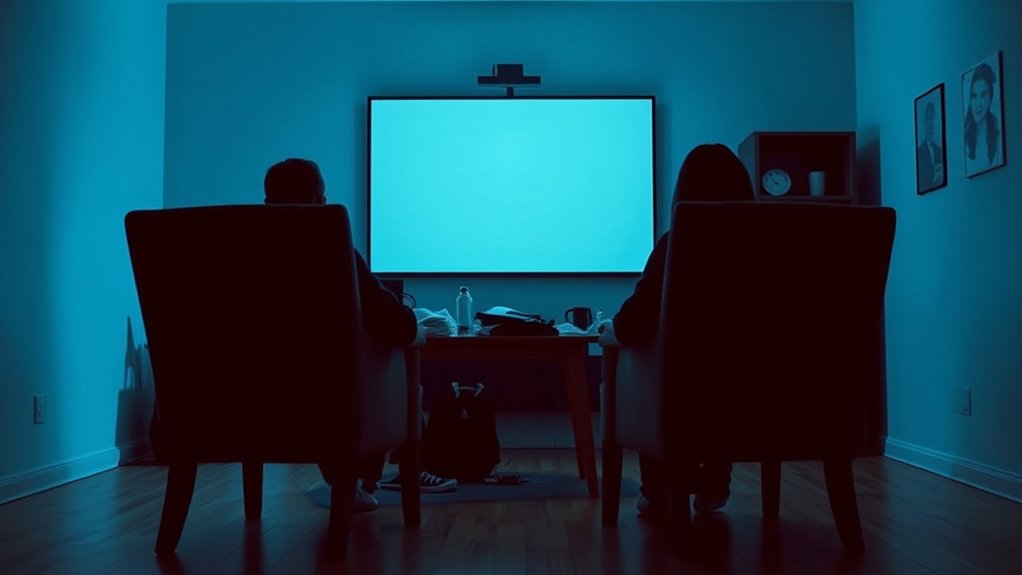When your long-term partner suddenly goes offline, it can feel confusing and hurtful. You might wonder if the relationship is really over or if you did something wrong. Often, ghosting stems from internal struggles with vulnerability or an avoidance of tough conversations, not necessarily a reflection of your worth. Recognizing the reasons behind it can help you detach from the emotional charge. To understand more about handling this situation, keep exploring these complex dynamics.
Key Takeaways
- Ghosting often reflects internal struggles or discomfort with confrontation rather than relationship failure.
- Sudden silence creates emotional uncertainty, triggering feelings of abandonment, anxiety, and self-doubt.
- Recognizing communication breakdowns helps detach emotional reactions and reduces self-blame.
- Reaching out for clarity may be tempting, but respecting the partner’s silence can promote healthier boundaries.
- Focusing on self-care and support helps heal emotional wounds caused by long-term ghosting.

Ghosting in long-term setups can be particularly confusing and frustrating because it leaves you uncertain about where you stand. When your partner suddenly goes offline without explanation, it feels like a communication breakdown has occurred, but you’re left in the dark about what went wrong. You might replay conversations or question whether you missed signs of emotional avoidance. This silence can make you feel isolated, angry, or anxious, especially since the stability you once relied on suddenly feels fragile.
You begin to wonder if this silence is a temporary withdrawal or a sign that your partner has emotionally checked out. Sometimes, people ghost because they’re uncomfortable with confrontation or fear hurting your feelings. They might avoid difficult conversations altogether, choosing instead to disappear rather than address their feelings openly. This emotional avoidance isn’t always about you personally; often, it’s a reflection of their own discomfort with vulnerability or conflict. Still, it leaves you questioning whether the relationship is truly over or if there’s a chance for reconciliation.
In these moments, your mind races with questions. You might ask yourself if there’s anything you did wrong or if you should reach out again. It’s tempting to send messages or texts, hoping for clarity, but that can sometimes backfire if your partner continues to remain offline. Remember that their silence isn’t necessarily a reflection of your worth or the relationship’s value. It’s more about their inability or unwillingness to face the situation head-on, which can be rooted in emotional avoidance. Recognizing the role of communication breakdown in these situations can help you understand that their silence is often a sign of internal struggles rather than a reflection of your relationship’s failure.
This period of silence can also trigger deeper insecurities, making you doubt your importance or desirability. It’s natural to feel hurt or confused, but it’s essential to recognize that ghosting often says more about the other person’s struggles than about your relationship. Instead of obsessing over what went wrong, focus on your own emotional well-being. Reach out to trusted friends or family for support, and give yourself space to process your feelings.
Ultimately, understanding that ghosting stems from issues like communication breakdown and emotional avoidance can help you detach some of the emotional charge from the situation. While it’s painful not knowing where you stand, remember that you deserve honesty and respect. If your partner chooses to withdraw without explanation, it’s a sign that they might not be ready or willing to engage in healthy communication. In the long run, prioritizing your emotional health and seeking clarity—whether through direct conversation or acceptance—will help you move forward.
Frequently Asked Questions
How Can I Tell if My Partner Is Intentionally Ghosting?
To tell if your partner is intentionally ghosting, look for signs of avoidance and emotional withdrawal. If they suddenly stop replying without explanation, ignore your messages, or become distant, these are red flags. You might notice they avoid conversations or seem less interested in connecting. Trust your instincts—consistent silence and a lack of effort to communicate often indicate they’re intentionally pulling away, rather than just being busy or distracted.
What Are the Psychological Effects of Long-Term Ghosting?
Long-term ghosting can lead to trust issues, making you doubt others’ intentions and honesty. You might also develop emotional detachment as a defense mechanism, shielding yourself from further hurt. This ongoing silence can cause feelings of abandonment, anxiety, and sadness, impacting your mental health. Over time, you may struggle to form new connections or fully trust future partners, as the psychological effects of prolonged ghosting linger and shape your emotional responses.
Can Ghosting Be a Sign of a Deeper Relationship Issue?
You might wonder if ghosting signals a deeper relationship issue. Often, it stems from emotional detachment or a communication breakdown, where one partner struggles to address problems openly. Ghosting can be a way to avoid confrontation or emotional discomfort. Recognizing this pattern helps you understand that long-term ghosting isn’t just about disappearing; it highlights unresolved issues and a potential imbalance in emotional connection.
How Should I Respond if My Partner Reappears After Ghosting?
When your partner reappears after ghosting, it’s important to set clear communication boundaries to protect your emotional well-being. Express how their disappearance affected you and discuss expectations moving forward. Prioritize emotional self-care by taking time to reflect on what you need from the relationship. Be honest about your feelings and decide if you’re willing to rebuild trust. Remember, maintaining healthy boundaries is key to your emotional health.
Are There Cultural Differences in Ghosting Behaviors?
When it comes to ghosting, you might find that cultural differences influence how people handle communication styles and norms. In some cultures, silence is a way to save face, while in others, directness is valued. Recognizing these differences helps you avoid jumping to conclusions. Remember, what’s considered ghosting in one culture might be seen as polite in another. It’s all about understanding the context and respecting diverse ways of interaction.
Conclusion
So, next time you notice your partner suddenly going offline, remember it’s no coincidence. Sometimes, people drift apart quietly, almost like they’re fading into the background without notice. It’s a reminder that even in long-term setups, communication remains essential—don’t wait for ghosting to be your only sign. Stay connected, be aware, and trust that the moments you share are real, just like the unexpected coincidences that remind us how fragile relationships can be.









